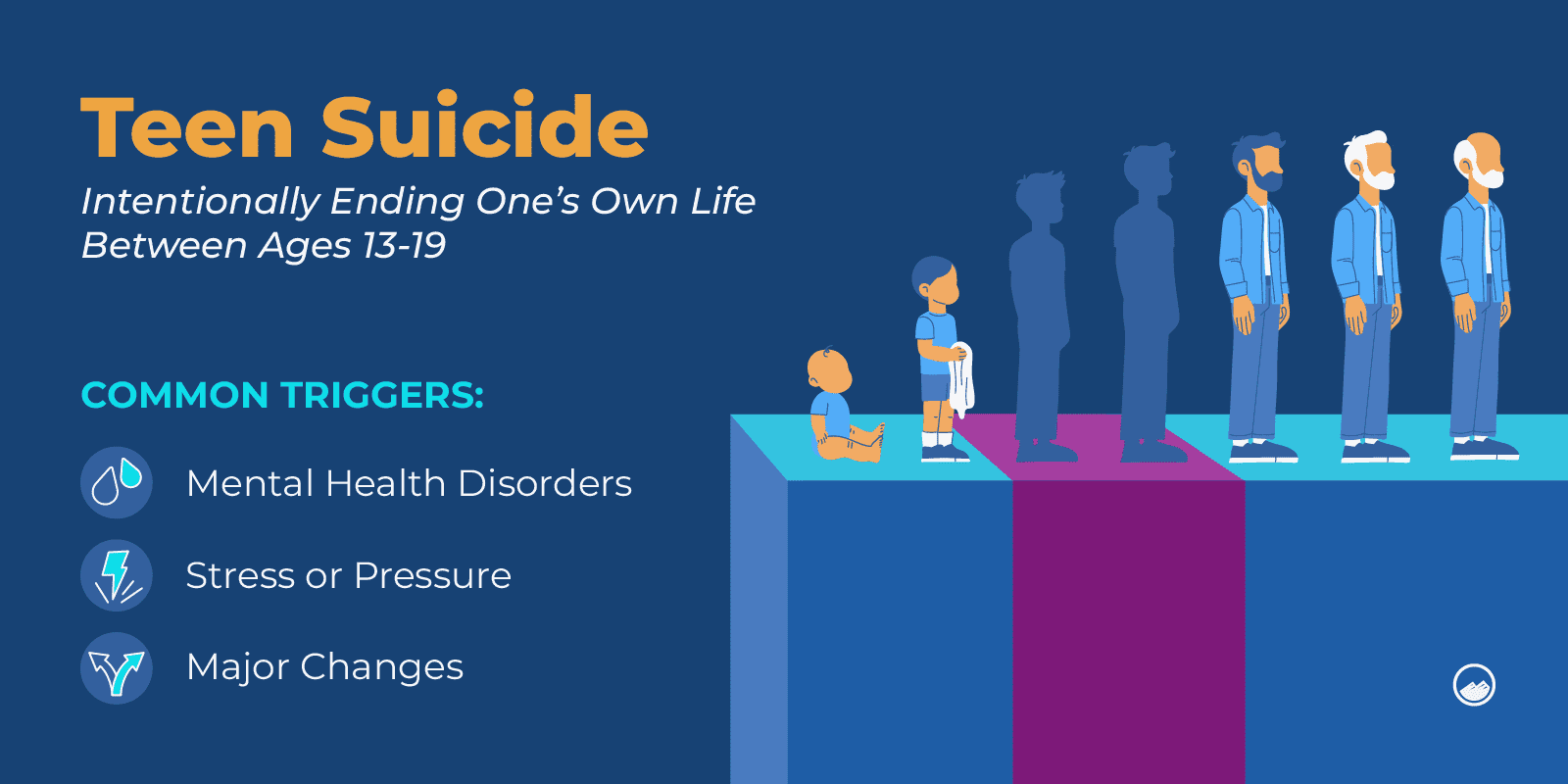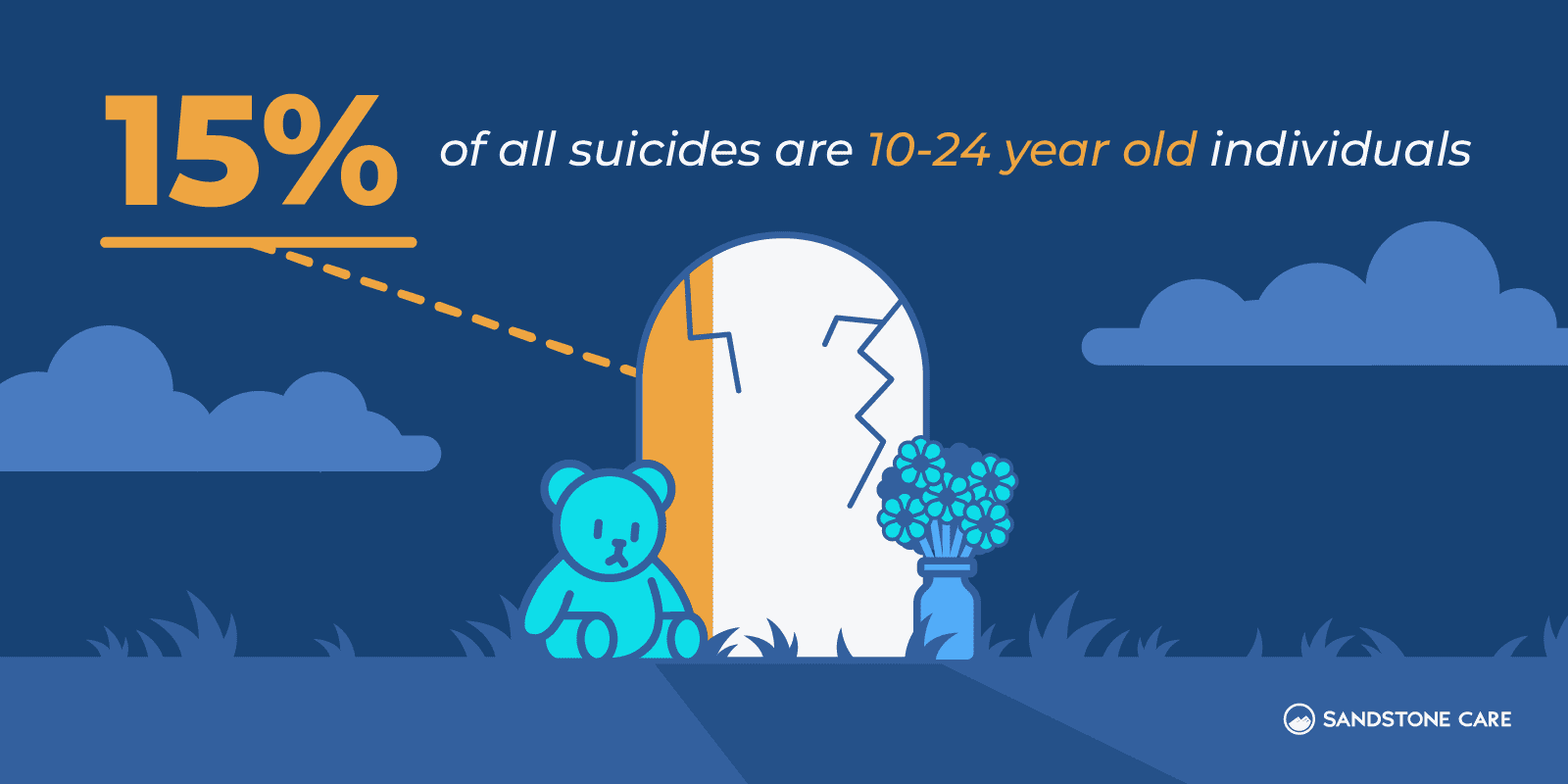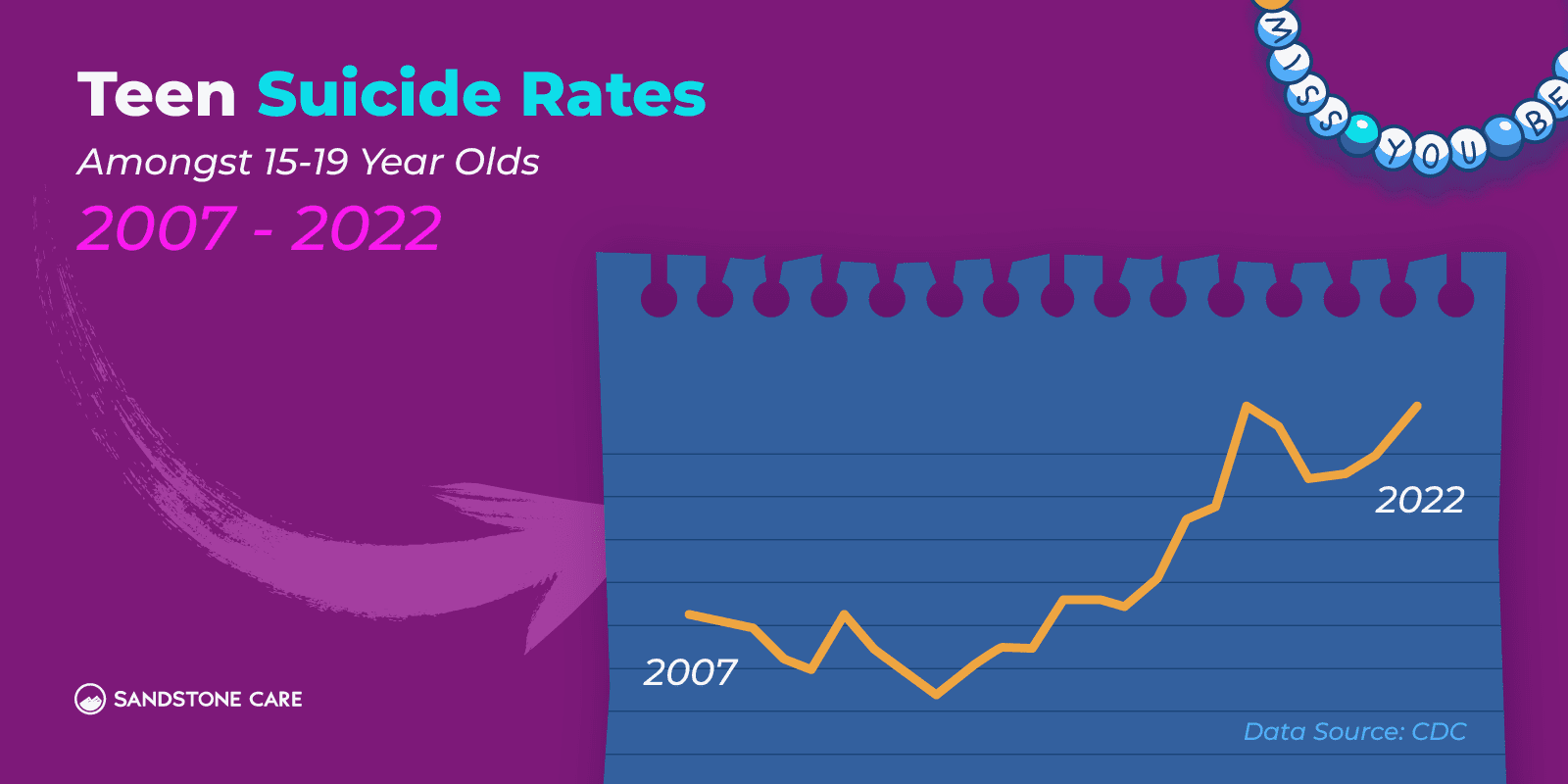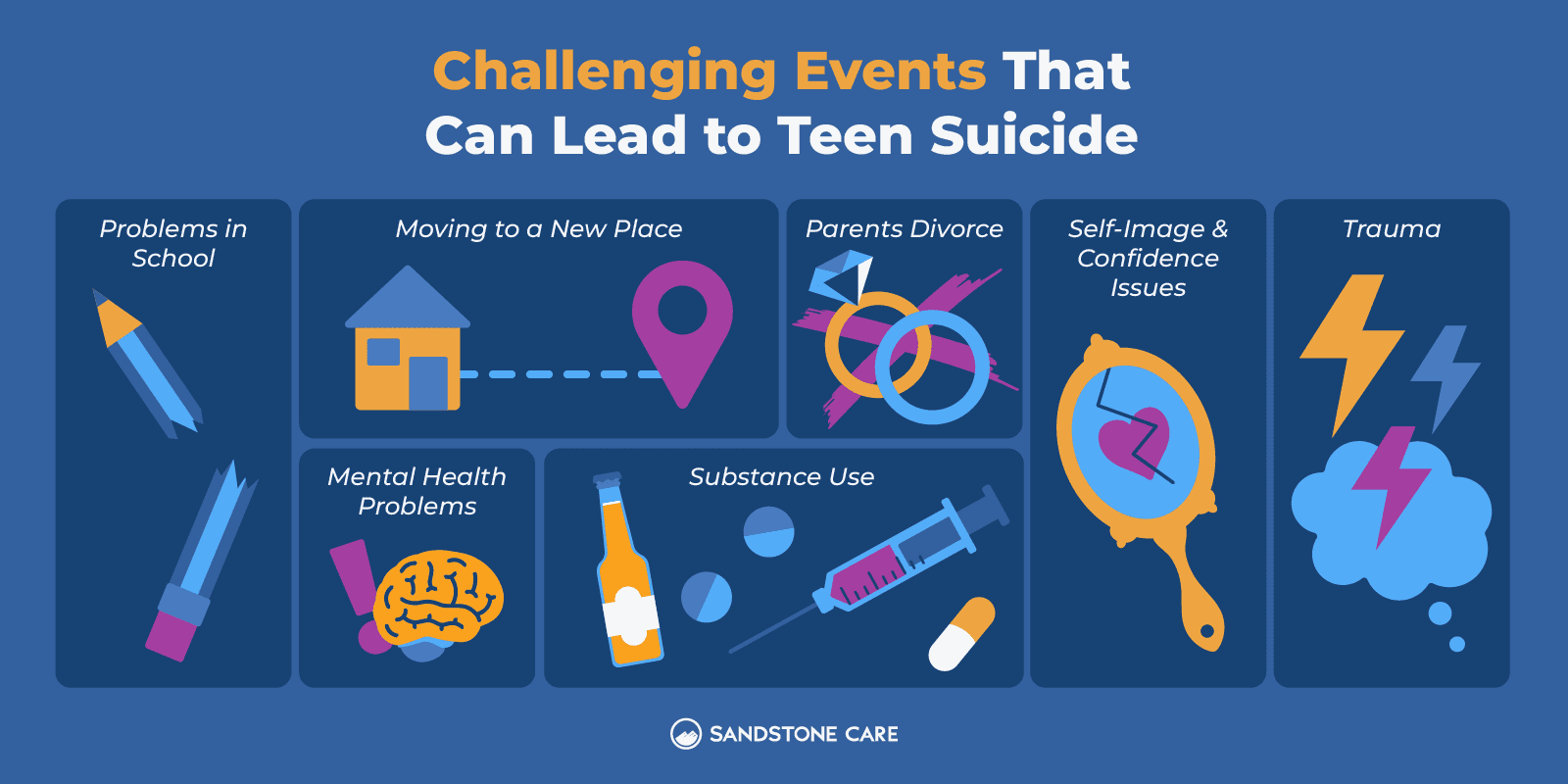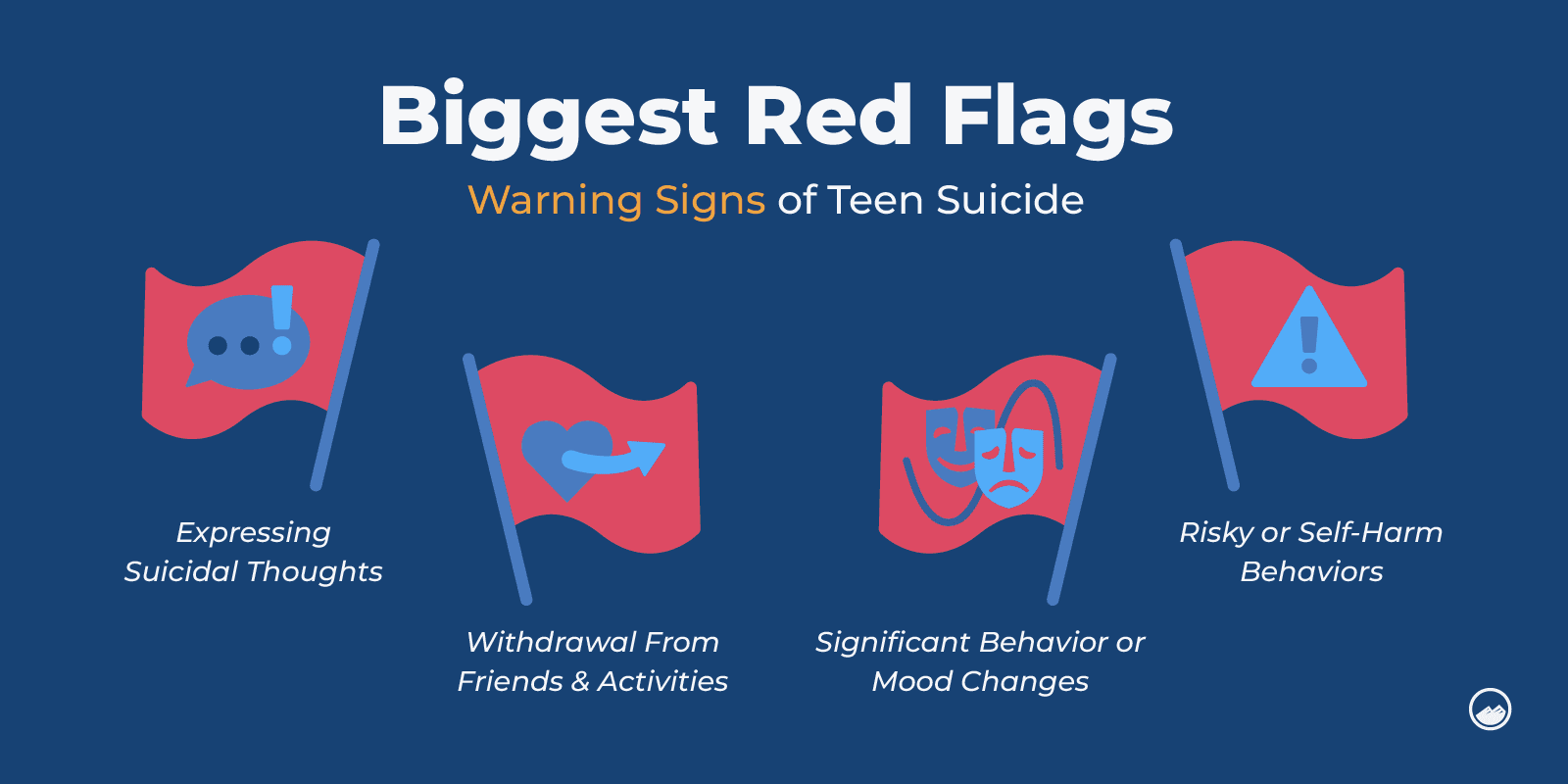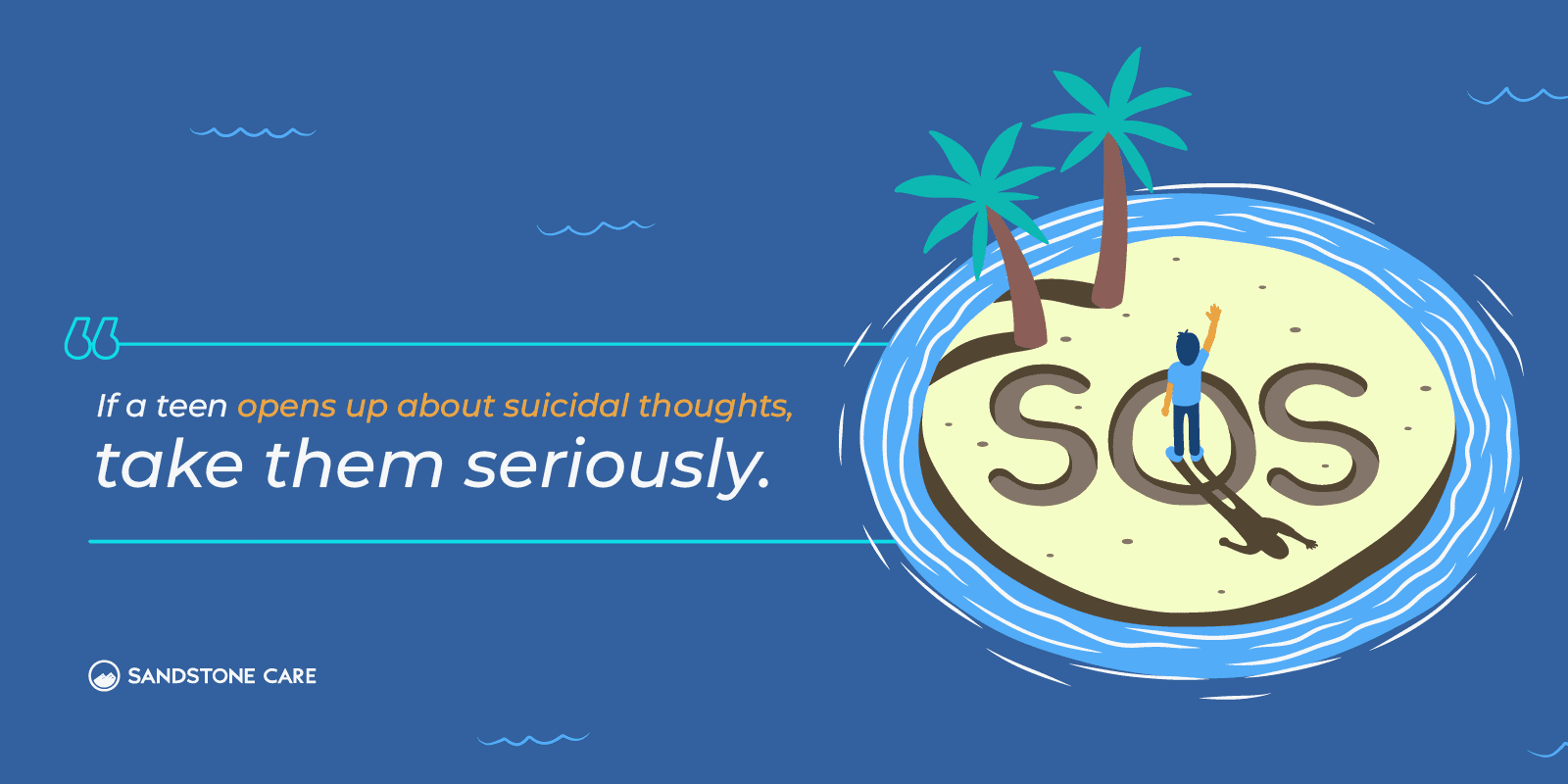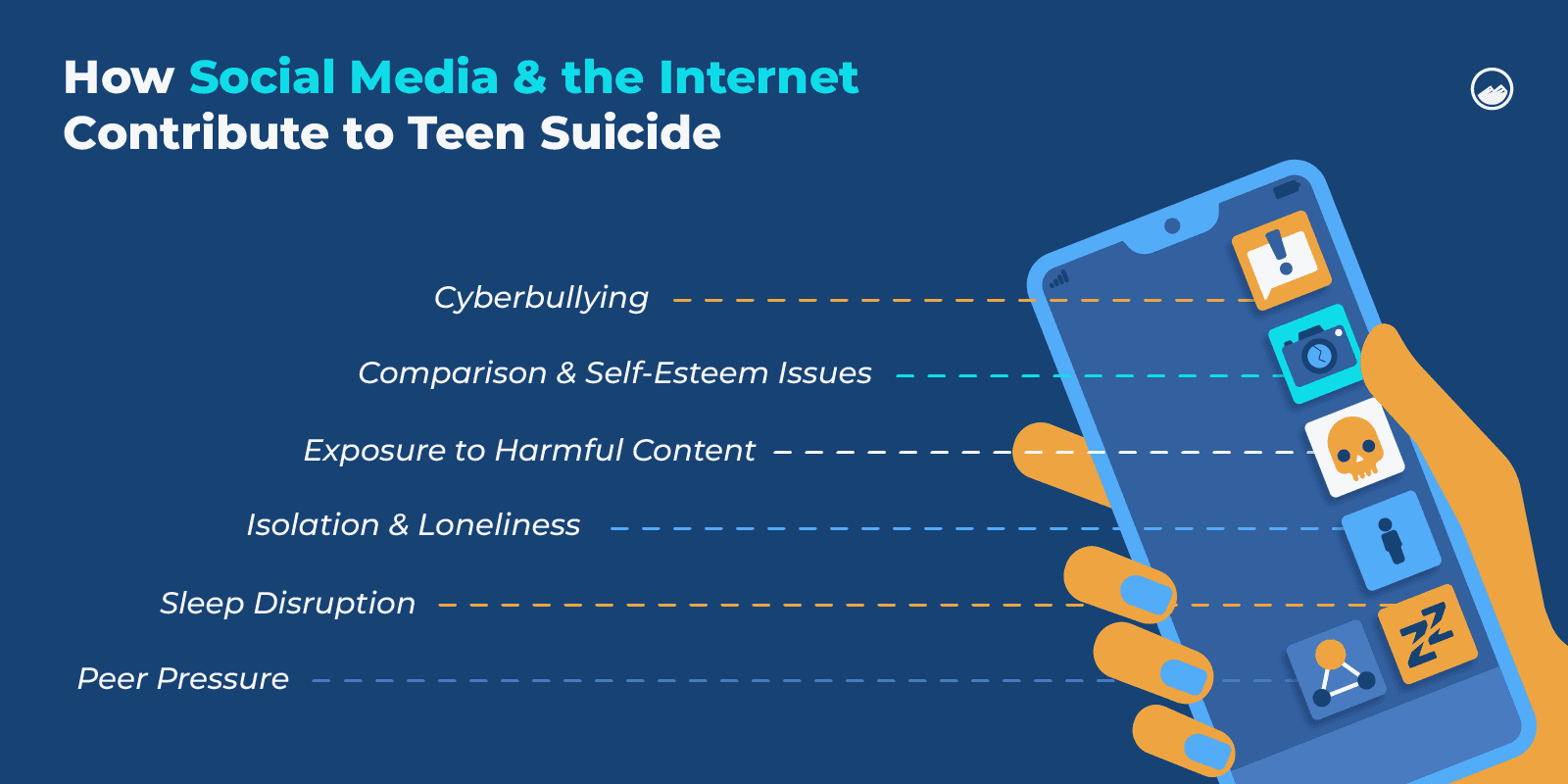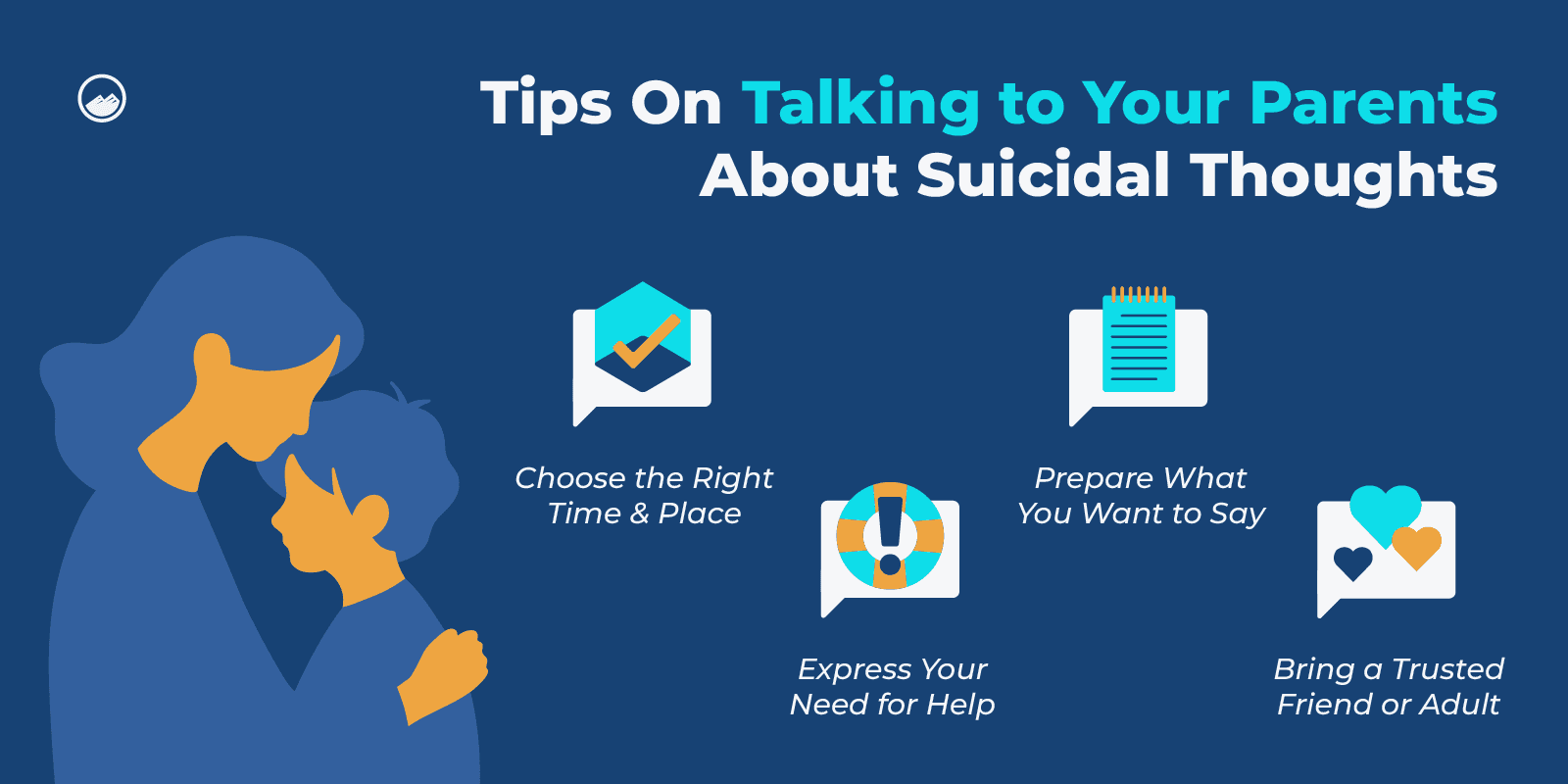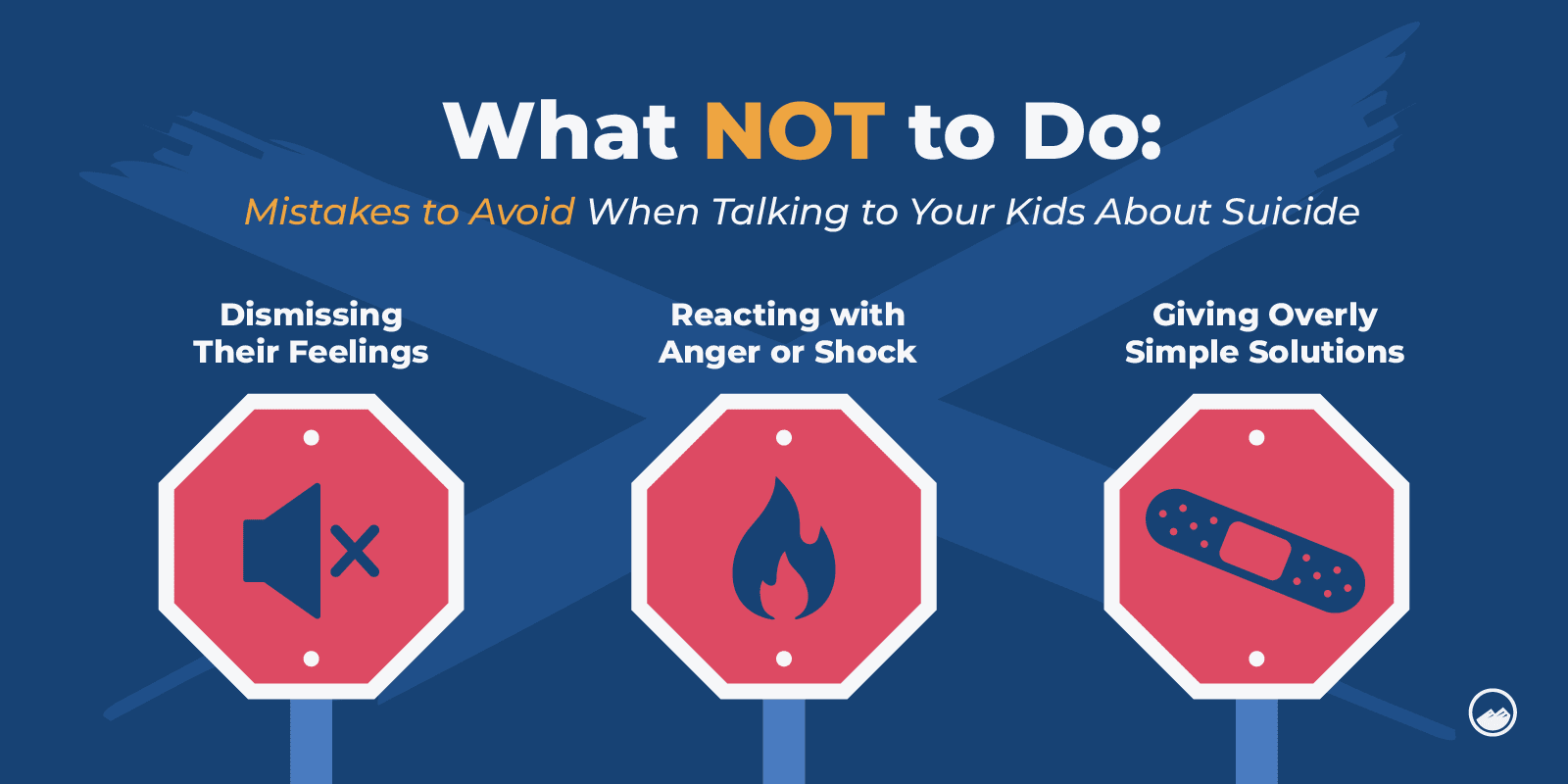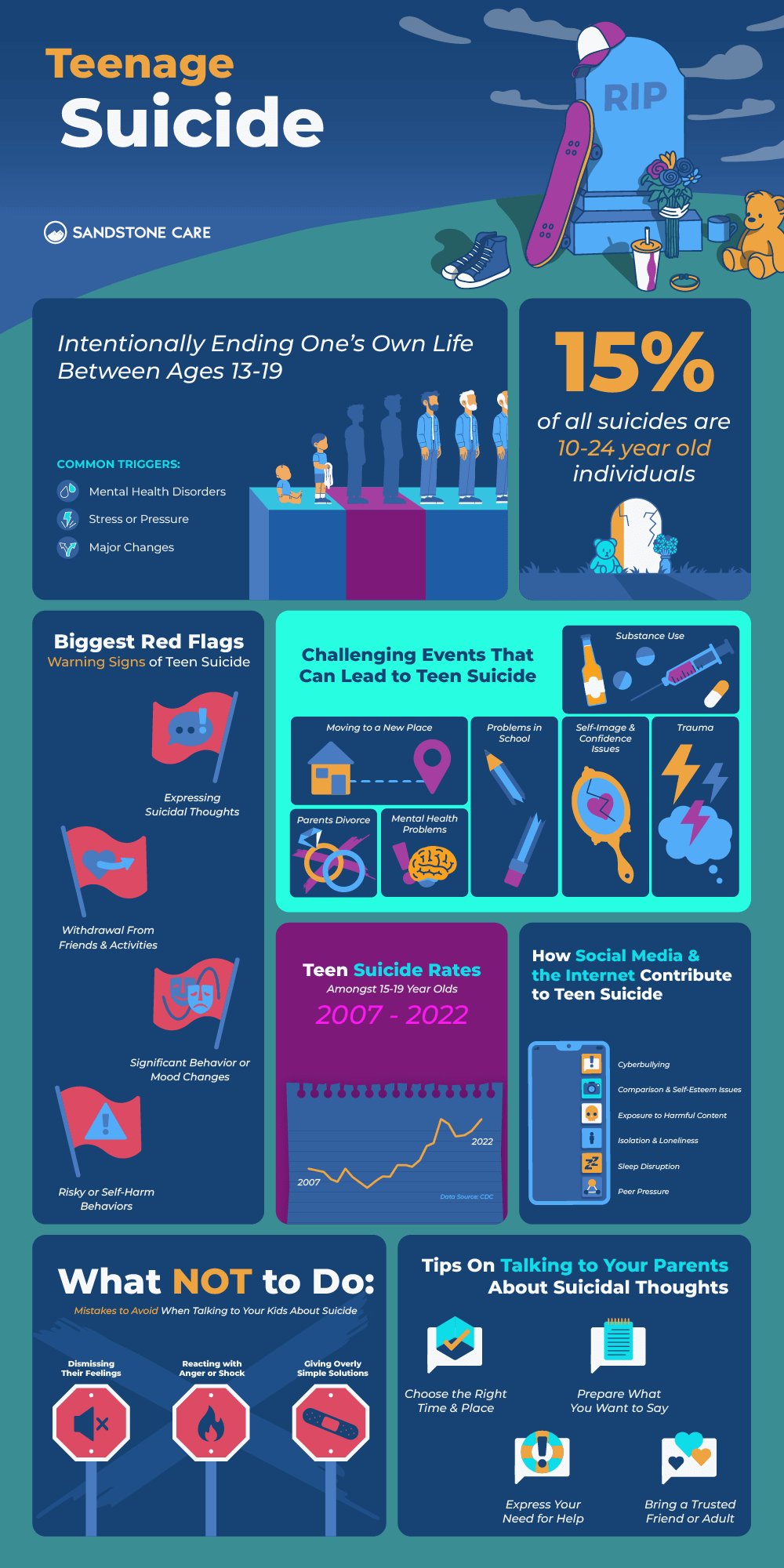Trigger warning: Content may include references to topics such as self-harm, suicide, death, and violence.
If you or a loved one is experiencing suicidal thoughts or is in imminent danger, reach out for help. You can call the National Suicide Prevention Lifeline at 988 or call 911.
You are not alone.
Suicide in Teens
What Is Teen Suicide?
Teen suicide, also known as adolescent suicide or youth suicide, refers to the act of intentionally ending one’s own life by individuals who are between the ages of 13 and 19.
The teenage years involve major transitions, changes, stress, and pressure. These major challenges can increase the suicide risk of teens as they struggle to process the physical, emotional, social, and mental transitions they are hurtling through.
Are Teens More Likely to Commit Suicide Than Adults?
Anyone can be at risk for suicide, however, the stress of adolescence can sometimes trigger teens who are at risk of mental health issues.
According to the Centers For Disease Control And Prevention (CDC), “youth and young adults ages 10-24 account for 15% of all suicides”.
The age group with the highest suicide rates includes adults ages 75 and older.
However, suicide is the second leading cause of death for American adolescents and young adults.
How Are Families Affected by Teen Suicide?
Teen suicide can have devastating emotional, mental, and physical effects on loved ones and family members.
When a person loses someone to suicide, it can trigger a lot of mental health challenges and trauma. They might feel guilty that they couldn’t help them or experience mixed feelings of sadness, anger, grief, and helplessness.
It is also important to note that family members of someone who has committed suicide are at a greater risk of suicidal thoughts themselves.
If you have been affected by suicide, know that you are not alone. Reach out for help.
Teens Suicide Rates
How Many Teens Commit Suicide?
According to the Centers for Disease Control and Prevention (CDC), 1,952 suicides occurred among high-school-aged young people between the ages of 14 and 18 in 2021.
Are Teen Suicide Rates Increasing?
Reports show that suicide death rates among young people ages 10-24 increased from 2007-2017 by 56 percent.
In 2019 and 2020 suicide rates were on a decline from previous years, however, in 2021, suicide rates increased back to their peak from 2018.
Causes of Suicide in Teens
Why Do Teens Commit Suicide?
The teenage years are full of new challenges and changes that can be very difficult to process and cope with.
For example, high school students are often under extreme stress to perform well in school, have bustling social lives, and help support their family. LGBTQ+ teens often experience bullying and discrimination as they grapple with their identity. Situations like these can lead to hopelessness, depression, and fear.
Some things that can impact a teen’s mental health and overall well-being can include:
- Family changes, such as parents going through a divorce or moving to a new place
- Trauma
- Problems in school
- Self-image, confidence, and self-worth
- Underlying mental health conditions
- Substance use
The difficult situations that teenagers find themselves in can lead to feelings of stress, insecurity, and feeling a loss of control.
It can be very difficult to cope with all these different challenges as a young person, and it can worsen overtime, leading to suicidal thoughts.
Risk Factors of Suicide in Adolescence
Some factors that may put an adolescent more at risk of suicide can include:
- Experiencing traumatic life events
- Underlying mental health disorder or substance abuse
- Family history of suicide or mental health disorders
- Exposure to suicidal behavior
- Previous suicide attempts
- A lack of trusted adults and strong support systems
Is Depression Is Leading Cause of Suicide in Teens?
Young people with depression are at a higher risk of suicide.
Oftentimes, children and adolescents who attempt to commit suicide have an underlying mental health condition, which is commonly depression.
Can Teen Drinking Lead To Suicide?
Research shows that alcohol use can be connected to a higher risk of suicide because of its impact on inhibition, impulsivity, and impaired judgment.
While drinking on it’s own may not directly lead to suicide, it can worsen existing feelings of hopelessness, cause social issues, and lead to physical and mental issues.
Signs of a Suicidal Teenager
What Are Signs of a Suicidal Teenager?
Warning signs of suicide can also be similar to the symptoms of depression and other mental health disorders and can include:
- Sudden changes in sleeping and eating habits
- Loss of interest in things they used to love once
- Isolating and withdrawing from friends and family
- Substance use
- Physical health concerns like frequent stomachaches, headaches, or extreme fatigue
- Engaging in risky behaviors
- Neglecting self-care
- Running away
- Difficulty focusing or concentrating
- Passive or active suicidal ideation
Other signs of someone who might be suicidal are talking about death or planning suicide. For example, they might say things like “I want to kill myself”, or “If anything happens to me, I want you to know that…”.
Something that is often overlooked is this rush of euphoria and cheerfulness or excitement that someone might feel when they have come up with a plan to die from suicide.
Often, when a person has been contemplating suicide and they decide to carry it out, they feel this sense of freedom or relief that they have decided to end all the challenges they have been going through. They might throw a party out of nowhere, or seem happy and excited after being down and isolated for a while.
Even when someone starts therapy, they might come out a day or a few days later being extremely excited and happy making it seem that their whole life changed overnight, when in reality, change doesn’t typically happen this quickly.
If you notice something like this happening, talk to the person. Let them know that you are concerned, that you are there for them and they are not alone, and help them get help.
Is My Teen Depressed?
Common signs of teen depression can include:
- Lack of interest or motivation in things they used to once love
- Feelings of sadness, hopelessness, or worthlessness
- Isolating and withdrawing themselves from loved ones and friends
- Changes in sleep and eating habits
- Unexplainable physical health problems such as frequent headaches or pains
If you think your teen might be depressed, talk to them or help them reach out to a professional to get a proper diagnosis and the support they need.
Are Suicidal Thoughts Normal for a Teen?
Teen suicide is a serious concern.
If a teen opens up about suicide, they should be taken seriously and not brushed off.
It is normal for teens to go through many changes and challenges throughout their teenage years, however, suicidal thoughts indicate a need for help.
Does Cutting Mean a Teen Is Suicidal?
Cutting doesn’t necessarily mean a teen is suicidal, however, those who self harm are at a higher risk of suicidal thoughts.
It is a form of self-harm and is used by teens and young adults as a way to cope with difficult experiences or feelings.
Cutting doesn’t mean that a teen is trying to die by suicide, but it can indicate an underlying problem and that they are going through something difficult and is a sign that they need help.
Addressing self-harm means addressing the root cause and what is truly going on inside. The longer self-harm goes on, the worse it can get, and it can eventually lead to suicidal thoughts and behaviors.
Even if cutting doesn’t necessarily mean a teen is suicidal, it is still very serious and dangerous and is a cause to reach out for help.
Social Media and Teen Suicide
Does Social Media Contribute to Teen Suicide?
Yes. The rise of social media has been shown to have negative impacts on teen mental health, including suicide.
Studies suggest that there is a growing amount of evidence that shows that the internet and social media influence suicide-related behavior.
Social media can affect the way young people see themselves, the world, and have a negative impact on their overall health.
How Many Teens Commit Suicide Due to Cyberbullying?
It is unclear how many teens attempt to die by suicide due to cyberbullying, however, the negative mental health impact cyberbullying can have on a teen may put them more at risk for suicidal thoughts and suicidal ideation.
Cyberbullying is often hidden away from loved ones, which can make it challenging to provide concrete numbers on how many teens have been lost due to online cruelty.
However, cyberbullying can contribute to feelings of depression, anxiety, isolation, and hopelessness, which may increase the risk of suicide among vulnerable individuals.
Teen Suicide Prevention
Do Suicidal Teens Ever Recover?
Yes, suicidal teens can recover.
With proper, evidence-based care and support, a teen can get the help they need to address what is driving their suicidal ideation.
Things that can help recovery can include:
- Attending therapy
- Joining support groups
- Practicing self-care
- Practicing mindfulness and meditation
- Connecting with loved ones
How to Tell Your Parents You’re Suicidal?
Talking about suicide is not an easy thing to do.
Many teens and young people might be afraid or feel ashamed to tell their parents that they are suicidal. You might be worried about the way they will react or you don’t want to make them upset.
However, not talking to anyone about suicidal thoughts can leave you feeling alone and helpless, and it can get worse over time.
Here are some different things to say that may help you when talking to your parents about suicidal thoughts.
One way to open up a conversation about suicide with your parents is by talking about things you might be struggling with. Whether it be challenges at school, work, relationships, or friendships, challenges keeping up with caring for yourself, or anything else you may be having a hard time with.
When they hear about these challenges, they might better understand how they can help and it can also make it easier to transition into a more difficult conversation.
Also, highlighting the urgency of having a conversation is important. If you tell your parent you want to talk about something, they might put it off because they don’t know how serious it is. Telling them you have something important to talk about right now is important in making sure that you don’t brush it off too and don’t go on to not tell anyone about it.
If speaking to your parents about suicide feels too overwhelming, you can also write down how you feel and share it with them.
How to Talk to Teens About Suicide
If you have noticed warning signs of suicide in your teen or loved one, there are different ways you can start a conversation with them.
Talking to a teen about suicide can be very scary, often because you want to be there to help them but you also don’t want them to feel hurt or confronted.
Some things that can help when talking to teens about suicide can include:
- Make sure you are in a quiet, private, and comfortable environment
- Start the conversation by asking them how they are doing and expressing things you might have noticed that brought up your concerns
- If they are opening up about their feelings, be a good listener and avoid invalidating or minimizing their feelings and making things seem like they are not a big deal, if they are telling you about something it means it meant a lot to them
- If your teen doesn’t want to talk to you about it, ask them if there is someone that they would feel comfortable telling.
Conversations about suicide can be very difficult, overwhelming, and emotional. Sometimes, teens might hold back from talking about suicide because they are scared of how their parents might take it.
Hearing their parent open up a conversation about it might make them feel relieved or more comfortable opening up.
How to Help a Suicidal Child
If a child has a suicide plan or is in imminent danger, call 911 immediately, or call the National Suicide Prevention Lifeline at 988.
Mentions of suicide or suicidal thoughts from a child should always be taken seriously. If they aren’t in imminent danger, you can call their pediatrician, health care provider, or reach out to another mental health professional who can provide proper care, support, and resources.
Provide a safe and supportive environment. If they open up to you, listen to what they say, try to stay calm, and let them know you are there for them. Spending time with them, addressing their needs, and connecting them to professional help are all important part to understanding and addressing the root cause of their suicidal thoughts.
When one person in a family is struggling, it can impact each member of the family differently. Reach out to help for yourself too if you need support for your own mental health.
Dialectical Behavior Therapy With Suicidal Adolescents
Studies show that dialectical behavior therapy can be effective in helping reduce repeat suicide attempts in adolescents who are highly suicidal.
Dialectical Behavioral Therapy (DBT) is a form of cognitive behavioral treatment that focuses on emotion regulation, distress tolerance, mindfulness, and interpersonal effectiveness.
The skills and techniques used in DBT can help reduce self-harm and suicide in adolescents and young adults.


